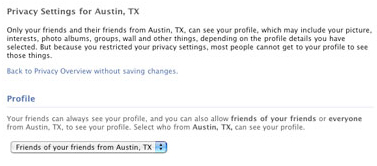Facebook follows MySpace: Online predator risks

Facebook views MySpace as an open media portal, while considering itself a technology platform enabling communication and interaction among networks of trusted friends, Dan Rose, Vice President, Business Development, told me last week at the Media Summit in New York City (see “Facebook: ‘technology business, not media business’”).
Rose’s current juxtaposition mirrors how Melanie Deitch, Director of Marketing, described Facebook versus MySpace to me last Fall (see “Facebook talks ‘The Real Deal’ in exclusive interview”).
I asked Deitch: When Facebook opened its virtual doors to anyone via regional networks the Facebook blog assured students of their continued exclusivity by saying that “Friendship on Facebook is, in and of itself, a privacy setting.” MySpace has a different stance on friendship, Tom Anderson is everyone’s friend, and the social networking site believes its open friendship policy is a competitive advantage. Why is Facebook’s “confirmed friendship” approach better?
DEITCH: MySpace and Facebook have two fundamentally different approaches to social networking. MySpace is more of a media portal and they are doing a good job. Facebook is an authenticated network where people interact with their real friends, based on real relationships and the real world around them. By authenticating people, it enhances real world relationships. We also give users granular privacy controls.
I asked: How will users know if other users are “real” in the new regional networks that do not require authentication?
DEITCH: Regional networks encourage a similar type of behavior. A user can only be registered in one region at a time, they chose the region that is most relevant to them, changes are limited to every few months, like in the real world.
I asked if a user could register several times by using multiple email addresses.
DEITCH: Potentially
Facebook describes itself as being made up of many networks, individual schools, companies or regions, each of which are independent and closed off to non-affiliated users. Facebook now claims over 16 million registered users across over 47,000 regional, work, college and high school networks.

Facebook prides itself on its “granular privacy controls,” underscoring that most Facebook users can view less than one percent of the site's total profiles:
Facebook has always provided sophisticated privacy settings to allow people to share information, and control exactly who sees it, for example, "everyone in a network," "only friends," or even "no one".
Despite Facebook’s controls, however, a serious security breach has apparently occurred.
Chris Kelly, Chief Privacy Officer, is cited byThe Hartford Courant:
We certainly have tried to make things as safe as we can, and that continues to be a core part of our mission. But nothing is ever going to be perfect... Anytime you have a community of 16 million people, there's going to be crime. And people determined to commit evil will find ways to break through.
Kelly’s remarks follow the arrest of a 23-year-old man in Illinois alleged to have used Facebook to pose as a teenage girl in an elaborate scheme to lure a 15-year-old boy to his home for sex.
Facebook safeguards may have been circumvented via the "hijacking" of an account of a female high school student.
Facebook to users and parents about “staying safe on Facebook”:
Facebook is a trusted environment for people to interact safely. We have invested heavily in building safety and privacy controls into Facebook. We provide our users with the tools needed to share information with only the people they want to see it.
According to Kelly, it's the first time there's been an accusation involving the use of Facebook to contact a minor for predatory reasons.
ALSO: MySpace: Can software really make it safer? and MySpace ‘friend’ may cost school $3 million